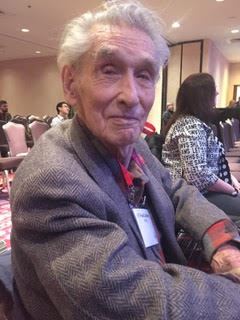Frank lefever (1931-2019) |

The Board of Directors of the New York Neuropsychology Group (NYNG) is deeply saddened by the loss of its founder and President Emeritus, Dr. F. Frank LeFever. Even into his ’80s and in the midst of medical challenges he never lost his passion for the field and remained a dedicated and spirited member of the organization he founded. Frank’s significant contributions to the field of neuropsychology will be honored with a lecture series in his name.
Dr. F. Frank LeFever, was born July 7, 1931 in Burwell, Nebraska. An intellectually curious, extremely bright student from the start, Dr. LeFever was recognized early-on for his desire to amass a broad, complex body of knowledge which could be applied to more specific problems. Upon graduation from high school, he was awarded a full scholarship to Kenyon College where he completed his Bachelor’s degree in 1953. Throughout high school and college Dr. LeFever would return to Nebraska each summer to work as a farm laborer planting corn/harvest and as a carpenter’s assistant. He would often delightedly reminisce about those days stating that before becoming neuropsychologist he “worked for a living.”
Following college, Dr. LeFever began his Master’s Degree at the City College of New York and later switched to begin his doctoral studies in Psychology at New York University. One of Dr. LeFever’s many points of pride includes that Dr. Hans-Lukas Teuber encouraged him to enter the field and supported his application to NYU’s Experimental Psychology program. Dr. LeFever dissertation involved “neuropsychological” testing of rats with focal lesions, examining deficits in sequential organization of responses in the context of two-lever counting and timing tasks, with histological studies to identify lesion location and trace paths mediating “prefrontal” effects of subcortical lesions. Throughout his doctoral training, Dr. LeFever also taught in several colleges before earning his Ph.D. (New York University, 1973), most notably CUNY’s Hunter College [others included NYU, Fairleigh Dickinson, Marymount Manhattan, Hofstra]; and two subsequently [Bergen Community College and Montclair State College].
Dr. LeFever’s transition to clinical work was deeply informed by Joseph Wolpe’s “June Institute” in Behavior Therapy and work as a Team Leader with the Prison Health Service (psychiatric unit on Rikers Island). It was through his clinical activities Rikers Island where Dr. LeFever became touched and passionate about the need for criminal justice system reform, something that he remained passionate about for the remainder of his life. In addition, Dr. LeFever completed a clinical internship in a Behavior Therapy unit on Ward’s Island [Manhattan Psychiatric Center], where he later worked prior to accepting a position at Helen Hayes Hospital (HHH). At HHH, Dr. LeFever worked primarily with head trauma patients, but also with stroke, MS, epilepsy, and others. Throughout his 30 years of service at HHH, Dr. LeFever conducted clinical research on a wide range of topics, including deep dyslexia, word deafness, cardiac deceleration, prosopagnosia, and various aspects of visual (non-verbal) memory and frontal lobe functions. Much of Dr. LeFever’s work was reported at meetings of the International Neuropsychological Society [also, TENNET, Academy of Neurology, National Academy of Neuropsychology, Cognitive Neuroscience Society, etc..]. In more recent years, Dr. LeFever turned his attention and insatiable quest to understand “how things work” to explore potential explanations for chronic problems after mild head trauma in terms of neuroimmune processes.
In addition to his innumerable clinical and research-related contributions, the neuropsychology community of New York is deeply indebted to Dr. LeFever for founding the New York Neuropsychology Group (NYNG), an organization which views the field of neuropsychology from a multi-dimensional lens (i.e., including the neurosciences, speech and language pathology, audiology, and other disciplines welcoming a bio-psycho-social approach to patient care). As Dr. LeFever was so fond of explaining when describing the origins of NYNG, there was an early meeting of The International Neuropsychological Society (INS) that took place in New York City in 1979, which called for groups to be formed to serve the needs of neuropsychologist at a local level. Dr. LeFever and colleagues rose to the occasion and quickly organized the first of 39 annual spring conferences in March of 1980 on Neuropsychological Assessment. Since that time, these conferences presented cutting edge research on a variety of topics related to the brain, including traumatic brain injury, memory disorders, sex-differences, and cross-cultural issues. The diversity and variety of themes and presenters is a testament to Dr. LeFever’s vision of a broadened, inclusionary view of neuropsychology. In addition to his work with NYNG, Dr. LeFever served as Chairman for the Psychology Section of the New York Academy of Science for many years and was an active member of INS.
An avid traveler, Dr. LeFever enjoyed excursions across the globe, most notably, taking a train from Lahti (Finland) to then-Leningrad (1988), which led to the first participation of Russian neuropsychologists in INS meetings. This inter-continental collaboration reached its peak following a NYNG-sponsored airlift of eight Russian neuropsychologists to and from the San Antonio meeting (1991). Dr. LeFever was most definitely a “student of the world” who taught himself Russian and Spanish, in addition to the German and French that he learned as a child.
In addition to his many academic, clinical and extracurricular pursuits, an extremely important facet to Dr. LeFever’s was his dedication to his family. Dr. LeFever was a loving father who, more recently, enjoyed sharing observations and knowledge made with his critical eye, sharp mind and even sharper wit with to his grandchildren.
May his memory be a constant reminder to all in the field of neuropsychology to always seek a more nuanced, multi-faceted understanding of “how things work.”
.jpeg)